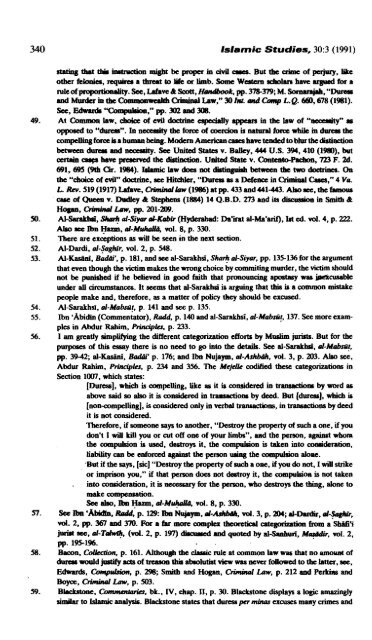LAW OF DURESS IN ISLAMIC LAW AND COMMON LAW: A ...
LAW OF DURESS IN ISLAMIC LAW AND COMMON LAW: A ...
LAW OF DURESS IN ISLAMIC LAW AND COMMON LAW: A ...
Create successful ePaper yourself
Turn your PDF publications into a flip-book with our unique Google optimized e-Paper software.
Islamic Studies, 30:3 (1991)<br />
stating that tbL imtrvction mi@t be proper in civil cmes. But the criau of perjury. Iike<br />
other felonies, reqe a threat to lik or limb. Some Watgn aebob have mpd for a<br />
rule ofpqmhdky. See. Mve & Sam, Handboo&, pp. 37Em. M. !hmaj&. "Dursu<br />
d Murder in the ClnnmonllraW CrimiaPl JAW." 30 1w. prd Canp L. Q. tXO,678 (1981).<br />
See,Ehvudr"."pppp.302md308.<br />
AtCammoalaw.~ofcvilMe~y~inthelawof"ntarity"a<br />
opposed to "duress". In neagity the force of mcrcion is natural face whik in duress the<br />
compelling fora isa human being. Modern Ameriaa c . have tended to blur the dirtinetion<br />
between durar d nearity. See United Stata v. Balky. 444 U.S. 394. 410 (1980). but<br />
ccrtaiu ampa haw praaved the dirtinction. United State v. Conteato-Padnm. 723 E 2d.<br />
691,695 (9h Q. 1981). Islamic law das not dbthpbh bmeen the two doetriaer. On<br />
the"chdaofWMe.=Hi~."~.saDefeaain~Csres."4Va<br />
L. Rev. 519 (1917) Lafaw. CriminolIm, (1986) at pp. 433 and 441-443. Abo ace, the ~~IUOUC<br />
cane of Qucen v. Dudley & Stephens (1884) 14 Q.B.D. 273 and its dkmkm in Smith &<br />
Hopn. Criminal Low, pp. 201-209.<br />
AlSaraLM. dSiyor d-Kabi? (Hyderabad: Da'int al-Ma'arif), Irt ed. rol. 4, p. 222.<br />
Abo scc Ibn m, d-MuMld, vol. 8, p. 330.<br />
There are exaptions as will be seen in the next section.<br />
Al-Dardi. d-Saghir, vol. 2. p. 548.<br />
Ai-K&ni. Badrk". p. 181, and see al-Sarakhsi. She@ d-Siyar, pp. 131136 for the argument<br />
that even though the victim makes the wrong choice by commiting murder, the victim should<br />
not be punished if he believed in good faith that pronouncing apostasy was i#*cusable<br />
under all circumstances. It seem that al-Sarakhsi is arguing that this is a common mistake<br />
peopk make and, therefore, as a matter of policy they should be excused.<br />
Al-Sarakhsi, d-Mabsai!, p. 141 and see p. 135.<br />
Ibn 'Abibin (Commentator). Rudd, p. 140 and al-Sarakhsi, d-Mobsti!. 137. See more examples<br />
in Abdur Rahim. Ptinciplcr. p. 233.<br />
I am greatly simplifying the &&rent categorizdtion efforts by Muslim juriats. But for the<br />
purpores of this essay there is no need to go into the details. See al-Sa&h& d-Mabsti!,<br />
pp. 39-42; al-KasiM, Bodcii' p. 176; and Ibn Nujap, d-Ashbtih, vol. 3, p. 2(n. Also see,<br />
Abdur Rahim, Principles, p. 234 and 356. The Mcj& codified these categorizations in<br />
Section 1007, which states:<br />
[Duress], which is canpelling, like as it is considered in tmudom by word as<br />
above said so also it is considered in tmmactions by deed. But [durese], which is<br />
[noncompellig], is considered only in verbal tmnsa&m, in transactions by deed<br />
it is not considered.<br />
Therefore, if someone says to another, "Destroy the property of such a one. if you<br />
don't I will kill you or cut off one of your limbs", and the person, against whom<br />
the anupubion is used, dsstroys it, the compulsion is taken into coarideration,<br />
liability &I be enforad agaiuat the person u& tbe compllaion &me.<br />
-But if the says, [sic] "Destroy the pmperty of such a one, if you do not, I will strike<br />
or imprison yw," if that peMn does not destroy it, rhc compulsion is not taken<br />
into consideration, it is nwesq for the person, who destroys the thing, alone to<br />
make compensation.<br />
See abo. Ibn Hum, d-Mu+& vol. 8, p. 330.<br />
See Ibn 'Abid~~, ilPldd, p. 129: Ibn Nujap, d - a d. 3, p. p(; d-Dudir, d-+z@t,<br />
d. 2, pp. 367 d 370. For a far mom complu theoretial catc~tion from a ShWi<br />
SCC, d-Tdug, (d. 2, p. 197) dLwrcd d quoted by alS.nb~& MnpddL, 4. 2,<br />
pp. 195-196.<br />
Bacon. Cdlecnbn, p. 161. Although the dsrsic rule at common law was that no amount of<br />
durar would jurtay .cts of treason tbi abrolutist view was never followed to the latter, me.<br />
Edwards, ~vlrion, p. 298, Smitb and Hogan, Crlminol Low, p. 212 d Perldar and<br />
Bop, Crlminol LAV, p. 503.<br />
Bk+ckstone. Cmma&rh, bk., IV, chap. 11, p. 30. Blackstone displays a logic amazingly<br />
similar to Islamic analysis. Blackstone states that duress per minar excuses many crimes and
















